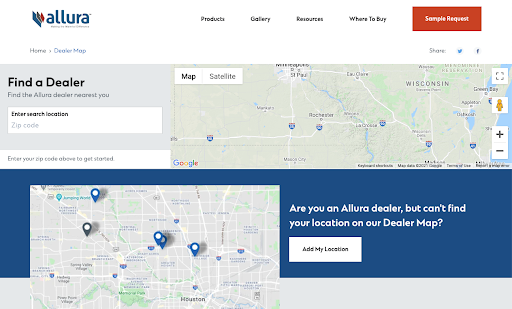In the rapidly evolving world of hybrid commerce, it is crucial that building material manufacturers make it fast and effective for buyers to find proximate outlets to purchase their products. To this effect, an elite dealer locator page on the company website is arguably the most important tool businesses can have for helping customers and end-users connect. The following breakdown looks at five ways for building materials manufacturers to optimize their dealer locator page.
1. Create a Mobile-Friendly Experience
Some people may think that the world of construction and building materials falls outside the e-commerce and mobile shopping craze. Think again. Innovative construction software has made it possible for contractors, architects, project managers, and owners to communicate in real-time. This includes regarding all facets of a construction project and doing everything from approving lien waivers to setting schedules. It also includes ordering more materials on the go.
As a result, it is critical that all building materials manufacturers have a dealer locator page that is extremely mobile-friendly. Statistics from Forbes show that mobile commerce is likely to grow by 68% through the end of 2022, so manufacturers that are not in a strong position to capitalize on this trend will miss out on some serious revenue.
In order to provide the best mobile experience, dealer locator pages should fit on all types of mobile screen sizes, with minimal scrolling involved. Ideally, the search bar will be in an attention-grabbing spot on the mobile screen (preferably with a red “go” bar to initiate the search), allowing mobile users to quickly and conveniently find the nearest place to obtain the materials they need.
2. Have Real-Time Inventory Information

There is no quicker way to draw the ire of buyers than to have them decide on purchasing your product, find the nearest dealer, and then discover the product is out-of-stock.
In such scenarios, buyers are far more likely to choose a competitor’s product than lookup an alternate outlet for purchasing yours.
As a result, the best dealer locator pages will come equipped with real-time inventory information. Buyers will not only be able to find the nearest vendor or contractor who carries your materials, but they will also see information as to the stock status of the products. If they determine that the nearest outlet to them does not have sufficient inventory to meet their needs, then they can easily search for the next most convenient place that does.
3. Leverage the Ability to Access User Location
Many buyers may complain about companies accessing their location, but the reality is that most of them really do want the convenience that location access provides. By having dealer locator software that determines the location of the customer using GPS, you save them the hassle of having to type in their current address to find the nearest vendor.
This is important because many buyers visiting a dealer locator page are ready to make a purchase. Because of this, the businesses that make this process as convenient as possible are the most likely to make a sale. Be sure to give customers the option of opting out of location access. But make it a standard part of your page for those who like the convenience.
4. Keep It Simple

The best dealer locator pages are creatively sparse. They will contain only vital information and nothing more. The search bar should be the focal point of the page. This is because the idea surrounding a dealer locator page is to assure specifiers ease of access to your products. It also assures the installation contractors that want to purchase the building product solutions you offer. The additional text should be kept to a pithy, well-positioned phrase that captures the essence of your business. You want to do this without distracting shoppers from their goal of buying materials.
Images can be helpful. A map with location pins near points of reference is a good idea for the central image of your page. A scrollable camera roll with pictures of the storefront can be useful for buyers. It confirms that they are at the right store upon arrival.
5. Make the Most Out of Local SEO
SEO is the name of the game in 2022. As a result, it is important that your page leverage the most current local SEO trends. Content, phrases, and captions should be relevant to the local SEO climate. For example, “Atlanta door hardware” or “Denver security technology” are a couple of SEO phrases. These may be relevant to building materials companies. When customers type in such location-specific phrases, they are more than likely past the stage of information gathering. They are looking for a specific outlet to make a purchase. Due to this, it is critical that your business is at the top of the search results. Even if your building materials company operates on more of a B2B model that is not directly concerned with retail transactions, local SEO is still extremely important. It creates pull by educating the end-user market on how to access your materials.
The Most Important Tips for Optimizing a Dealer Locator Page

(Image source by https://allurausa.com/)
The world of hybrid commerce has taken the building materials industry by storm in recent years. As a result, it is critical that manufacturers have the best dealer locator page possible. This makes it as quick and convenient for customers to locate their products.
With this in mind, creating a mobile-friendly experience, having real-time inventory information, leveraging location access features, keeping the page simple, and making the most out of local SEO are five of the most effective tips manufacturers can take for making the best dealer locator page possible. If you are a building products manufacturer and are actively seeking ways to improve your dealer locator page, contact the professionals at Bullseye Location Software for a consultation.

